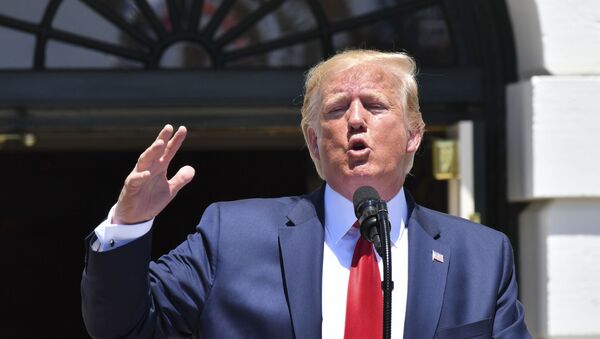US President Donald Trump said Friday that he would talk to the UK following the confiscation of a British-flagged oil tanker in the Strait of Hormuz, Reuters reported.
"We heard about it - we heard it was one, we heard it was two - we'll be working with the UK," Trump told reporters on the White House lawn. "This only goes to show what I'm saying about Iran, trouble, nothing but trouble. ... Let's see what happens."
Earlier Trump warned that Iran will pay a hefty price if it provokes US forces.
"We hope for their sake they don't do anything foolish. If they do, they will pay a price like nobody's ever paid a price", Trump said.
Britain's Foreign Secretary, Jeremy Hunt, later said that Iran had seized two naval vessels in Hormuz, a British-flagged oil tanker and a Liberian-flagged vessel.
Trump said the US would speak with the UK about the incident.
The president referred to diplomatic issues with Iran at the moment, adding that it's "very easy to straighten out, or it's very easy for us to make it a lot worse."
On Friday, the IRGC said that they had seized the UK-flagged oil tanker Stena Impero in the Strait of Hormuz. The confiscation occurred due to violations of international regulations, Press TV reported at the time.
Following the announcement, the UK Ministry of Defence said it was seeking information on the incident.
Meanwhile, the vessel owner, Stena Bulk, and ship manager Northern Marine Management confirmed in a statement that the UK-flagged Stena Imperio oil tanker with 23 crew members on board had been seized by unidentified boats and a helicopter at approximately 4 p.m. BST (15:00 GMT) during a passage through the Strait of Hormuz in international waters while currently headed toward Iran.
Tensions between the United States and Iran have escalated following the unilateral US 2018 withdrawal from the 2015 Joint Comprehensive Plan of Action (JCPOA).
Tehran has begun withdrawing from voluntarily obligations under the agreement, as allowed in the conflict settlement clause of deal's wording, as European signatories to the treaty have failed to effectively shield Tehran from sanctions re-imposed by Washington.
In 2019, Washington began building up its military presence in the region, citing an "Iranian threat", and accusing Tehran of attempting to manufacture nuclear weapons.
Iran has consistently reiterated that it does not seek nuclear weapons or war, with Iranian Foreign Minister Javad Zarif noting on Monday that, "Had we been interested in developing nuclear weapons, we would have been able to do it long time ago."


